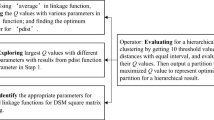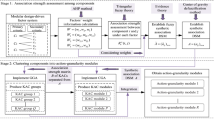Abstract
The modular design technology is of importance increasingly, as product structure is more and more complex. Modular design systems face challenging problems as the design information tends to be dynamic, redundant, and very large. This paper describes a novel approach for handling them. In this approach, a partition is firstly performed for the complex structural components by mapping functions to the structures layer by layer. Based on this partition, a comprehensive design matrix is then developed to identify the key design mode which is driven by a special function. The design process is also programmed by analyzing the coupled information on both the functional and structural hierarchies. Then, the integrated knowledge model based on object-oriented method and hybrid inference method is constructed. In this model, knowledge can be organized at hierarchical classification and expressed with different forms. Finally, the methodology developed has been applied to a real application in automobile cylinder block design and the results are presented.
Similar content being viewed by others
References
Rezayat M. Knowledge-based product development using XML and KCs [J]. Computer Aided Design, 2000, 32(1): 299–309.
Pahng G F, Ha S, Park S. A design knowledge management framework for active design support [C]// Proceedings of Design Engineering Technical Conferences. Las Vegas, Nevada, USA: ASME Press, 1999: 9023–9031.
Troxler P. Knowledge technologies in engineering design [C]// Proceedings of the 7th International Design Conference. Dubrovnik, Cavtat, Croatia: DS Press, 2002: 429–434.
Finger S, Dixon J R. A review of research in mechanical engineering design [J]. Research in Engineering Design, 1989, 1(1): 51–67.
Brunetti G, Golob B. A feature-based approach towards an integrated product model including conceptual design information [J]. Computer-Aided Design, 2000, 32(14): 877–887.
Hou Liang, Tang Renzhong, Xu Yanshen, et al. Research on knowledge base system of flexible modular design for mechanical products [J]. Journal of Zhejiang University, 2004, 38(1): 44–47 (in Chinese).
Stone R B, Wood K L, Crawford R H. Using quantitative functional models to develop product architectures [J]. Design Studies, 2000, 21(3): 239–260.
Gao Fei, Xiao Gang, Pan Shuangxia, et al. Method of product function module partition [J]. Chinese Journal of Mechanical Engineering, 2007, 43(5): 29–35 (in Chinese).
Erixon G, Yxkull A V, Arnstrom A. Modularitythe basis for product and factory reengineering [C]// Annals of the International College for Production Engineering Research. Paris, France: CIRP Press, 1996: 1–6.
Gu P, Mhashemian M, Sosale S. An integrated modular design methodology for life-cycle engineering [C]// Annals of the International College for Production Engineering Research. Paris, France: CIRP Press, 1997: 71–74.
Saaty T L. The analytic hierarchy process [M]. New York: McGraw-Hill Press, 1980.
Author information
Authors and Affiliations
Corresponding author
Additional information
Foundation item: the National Natural Science Foundation of China (No. 50935006), the National High Technology Research and Development Program (863) of China (No. 2009AA04Z147) and the Science-Technology Research and Development Program of Shaanxi Province (No. 2008KW-07)
Rights and permissions
About this article
Cite this article
Li, Bt., Hong, J., Li, T. et al. Modular design of complex product based on the triple fusion of function/feature/knowledge. J. Shanghai Jiaotong Univ. (Sci.) 15, 563–570 (2010). https://doi.org/10.1007/s12204-010-1049-4
Received:
Published:
Issue Date:
DOI: https://doi.org/10.1007/s12204-010-1049-4




